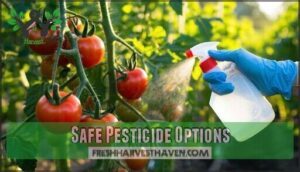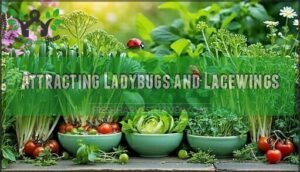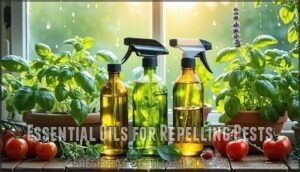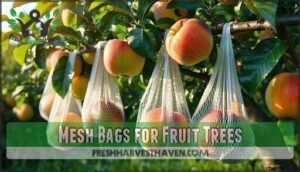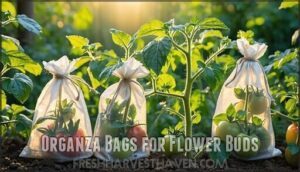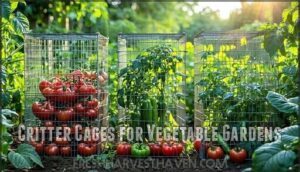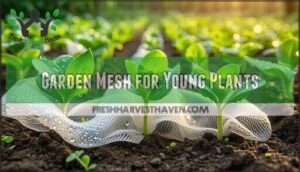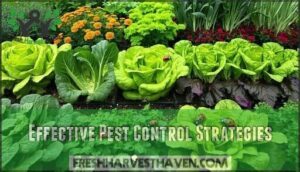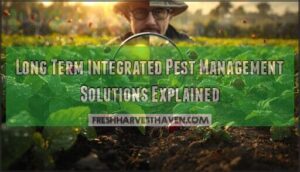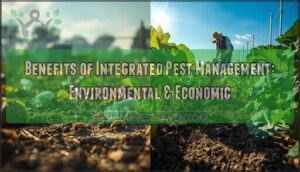This site is supported by our readers. We may earn a commission, at no cost to you, if you purchase through links.
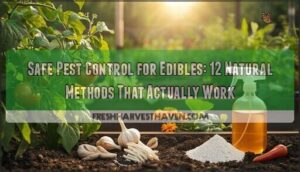
Simple homemade sprays made from garlic, dish soap, or chili peppers effectively deter many common garden pests. Neem oil and diatomaceous earth offer organic solutions that break down safely on plants.
Physical barriers like row covers and companion planting with marigolds or basil create natural pest deterrents. Beneficial insects such as ladybugs and lacewings hunt harmful pests for you.
These safe pest control for edibles approaches protect both your plants and your family’s health. The secret lies in combining multiple methods for maximum effectiveness.
Table Of Contents
- Key Takeaways
- Natural Pest Control Methods
- Safe Pesticide Options
- Beneficial Insects and Repellent Plants
- Physical Barriers and Protective Measures
- Effective Pest Control Strategies
- Frequently Asked Questions (FAQs)
- Which pesticides are safe for vegetable gardens?
- Why should you use safe pesticides in vegetable gardens?
- How to prevent a pest infestation in a vegetable garden?
- How do I apply safe pesticides in my vegetable garden?
- Are organic and safe pesticides good for your vegetable garden?
- How do I keep Bugs out of my Garden?
- What is the best pesticide for edible plants?
- What is the least toxic pesticide?
- What is the safest insecticide for vegetables?
- Is there such a thing as a safe pesticide?
- Conclusion
Key Takeaways
- You’ll protect your edible crops effectively by combining multiple natural methods rather than relying on a single approach—mix homemade sprays, beneficial insects, and physical barriers for maximum pest control.
- You can create powerful homemade pest deterrents using common kitchen ingredients like garlic, chili peppers, and mild soap that won’t leave harmful residues on your harvest.
- You’ll achieve long-term pest management by attracting beneficial insects like ladybugs and lacewings through companion planting with herbs and flowers that naturally repel harmful pests.
- You should inspect your plants weekly for early pest detection and use physical barriers like mesh bags or row covers as your first line of defense against garden invaders to ensure effective protection.
Natural Pest Control Methods
When pests threaten your edible garden, you don’t need harsh chemicals that leave you wondering what’s in your food.
These natural pest control methods use common kitchen ingredients to create effective sprays that protect your plants while keeping your harvest safe for the dinner table, utilizing natural pest control methods.
Garlic Spray for Pest Control
Garlic’s potency transforms ordinary gardens into pest-free sanctuaries through natural compounds that disrupt insect behavior. This homemade pest control solution repels aphids, beetles, and caterpillars while keeping your edible plants completely safe for harvest.
Transform your garden into a natural fortress where pests simply can’t survive.
- Mix crushed garlic with water – blend 15 cloves into 2 cups water, strain overnight
- Add soap for better adhesion – include mild liquid soap and vegetable oil for enhanced coverage
- Apply weekly for best results – spray frequency matters most during active pest seasons
Creating effective garlic spray requires proper plant compatibility testing on a few leaves first. The sulfur compounds mask your crops’ natural scents, making them less attractive to hungry pests. Unlike synthetic chemicals, this natural pest control method washes off easily and won’t accumulate in your vegetables. Apply during early morning or evening to prevent rapid evaporation and maximize effectiveness against soft-bodied insects.
Chili Pepper Spray for Pest Control
Beyond simple deterrence, chili pepper spray delivers pepper potency that disrupts pest nerve transmission while protecting beneficial insects.
You’ll create effective homemade pest control by blending fresh hot peppers with water and mild soap.
Spray effectiveness peaks with evening applications every 5-7 days, reducing aphid and spider mite populations by 70%.
Consider plant sensitivity by testing small areas first.
This safe pest control method requires basic safety precautions like gloves during mixing.
Application frequency increases after rain for sustained natural pest control on edible plants.
Soap Spray for Pest Control
Simple soap solutions pack serious pest-fighting power against aphids, mites, and other soft-bodied invaders. You’ll want castile soap for gentle yet effective organic pest control that won’t burn delicate leaves.
One effective method involves suffocating insects with a vegetable oil spray.
- Soap Types: Use mild liquid soap like castile to avoid plant sensitivity issues
- Homemade Recipes: Mix two teaspoons soap per quart water for safe pest control
- Application Frequency: Test small areas first, then spray affected plants every few days
This insecticidal soap approach offers garden pest control without harsh chemicals, though soap toxicity remains low for humans and beneficial insects.
Essential Oil Spray for Pest Control
Transforming aromatic plants into natural pest repellent solutions, essential oils offer targeted protection against garden invaders. These homemade pest deterrents work through concentrated plant compounds that disrupt insect behavior patterns.
| Essential Oil | Target Pests | Application Rate |
|---|---|---|
| Peppermint | Aphids, Spider Mites | 10-15 drops per cup |
| Rosemary | Beetles, Caterpillars | 12-20 drops per cup |
| Citrus | Whiteflies, Thrips | 8-12 drops per cup |
| Clove | Leaf Miners, Ants | 5-10 drops per cup |
Oil dilution requires careful measurement—too strong burns leaves, too weak proves ineffective. Test plant compatibility on small areas first. Application frequency matters most during early infestations, with weekly treatments during peak seasons.
These DIY insecticides provide indoor safety while maintaining garden health through nature’s own defense mechanisms.
Safe Pesticide Options
When natural methods aren’t enough, you’ll need safer pesticide alternatives that won’t turn your homegrown tomatoes into a chemistry experiment.
These organic options target pests effectively while keeping your edible plants safe for harvest.
Neem Oil Concentrate for Edibles
Neem oil concentrate delivers powerful organic gardening protection for your edibles. This natural pest repellent disrupts over 200 pest species while staying safe pesticides compliant.
Concentrate dilution requires 0.5-2% mixing ratios for desired results. Neem application works best during early morning or evening hours. Follow proper spraying frequency guidelines and observe pre-harvest intervals to address residue concerns.
You can easily find neem products online. Edible safety remains top priority with these pest control methods:
- Mix 5-20ml concentrate per liter of water
- Apply when beneficial insects aren’t active
- Wait 1-7 days before harvesting treated crops
- Wash all produce thoroughly after treatment
- Test small areas first to prevent leaf damage
Diatomaceous Earth for Pest Control
Three billion years ago, microscopic algae left behind a gift that’s perfect for pest control.
Diatomaceous earth works like tiny glass shards, puncturing pest exoskeletons and dehydrating crawling insects naturally.
Apply food-grade DE lightly around plant bases during dry weather—moisture reduces effectiveness.
You can even purchase diatomaceous earth online.
Remember DE safety: wear a mask during application since fine particles irritate lungs.
This organic gardening staple targets vegetable garden pests without chemicals, making it ideal for edible crops.
Organic Insecticidal Soap for Edibles
Your kitchen soap becomes a pest-fighting ally with this simple soap spray recipe. Mix two teaspoons mild liquid soap with two cups water for organic insecticidal soap that targets aphids and mites.
This mixture works through suffocation, making it perfect for edible gardening without harmful residues.
Application best practices include testing leaves first to avoid soap safety concerns. This natural pest management solution is a valuable tool in maintaining a healthy garden.
Horticultural Oil for Pest Control
When organic insecticidal soap can’t handle tough infestations, horticultural oil provides safe pest control for edible gardens.
This organic insecticide works through a suffocation mechanism, smothering aphids and mites effectively. **Neem oil concentrate is another effective option.
Here’s your oil application strategy:
- Select appropriate oil types based on plant safety requirements
- Apply during cooler temperatures to prevent leaf damage
- Make certain complete pest spectrum coverage on all plant surfaces
- Time applications properly to maximize effectiveness
Beneficial Insects and Repellent Plants
You’ll discover that beneficial insects like ladybugs and lacewings act as your garden’s natural pest control team, devouring aphids and mites.
This biological approach works around the clock, giving you effective protection without compromising the safety of your edible crops, while repellent plants create invisible barriers that keep unwanted visitors away, making it a natural method.
Attracting Ladybugs and Lacewings
Beyond commercial pesticides, nature provides powerful allies for your edible garden.
Ladybugs and lacewings serve as living pest control systems that won’t harm your harvest.
You’ll want to create Ladybug Habitats using Native Plants like yarrow and fennel near reliable Water Sources.
These spots become magnets for beneficial insects seeking shelter and sustenance.
| Requirement | Ladybugs | Lacewings |
|---|---|---|
| Food | Aphids, scale insects | Aphids, mites |
| Shelter | Dense shrubs, mulch | Tall grasses, weeds |
| Water | Shallow dishes, damp soil | Morning dew, irrigation |
| Plants | Dill, sweet alyssum | Cosmos, angelica |
| Season | Spring through fall | Late spring peak |
Lacewing Diets focus heavily on soft-bodied pests, making them perfect partners for natural pest management.
They are a key component of a balanced and healthy garden ecosystem.
By understanding the needs of these beneficial insects, you can create a thriving environment that promotes sustainable gardening practices.
Repellent Plants for Edible Gardens
Throughout your garden’s growing season, strategic repellent plants create natural pest barriers.
Aromatic herbs like basil reduce thrips by 60% in neighboring peppers, while marigolds suppress nematodes through root compounds.
These companion planting powerhouses work double duty:
- Marigolds deter aphids and root nematodes with alpha-terthienyl compounds
- Basil’s volatile oils repel thrips, mosquitoes, and beetles naturally
- Chives reduce Japanese beetle damage by 30% along garden borders
- Nasturtiums trap aphids while deterring whiteflies and squash bugs
- Lavender’s linalool prevents moth egg-laying near fruit trees
Adding neem oil sprays every 7-14 days can also disrupt insect feeding.
Companion Planting for Pest Control
Companion planting pairs up plants that naturally protect each other from pests. Basil and tomatoes work together beautifully—basil repels aphids while boosting tomato flavor.
Marigolds benefits include releasing compounds that deter nematodes underground. Dill with cabbage keeps harmful moths away, while mint repels pests like ants and rodents. Lavender’s role involves attracting beneficial predators.
| Plant Pair | Pest Controlled |
|---|---|
| Basil + Tomatoes | Aphids, whiteflies |
| Marigolds + Vegetables | Root nematodes |
| Dill + Cabbage | Cabbage moths |
| Mint + Various crops | Ants, rodents |
This natural method creates living pest barriers around your edibles.
Essential Oils for Repelling Pests
Essential oils provide effective natural pest control through safe dilution methods.
Mix 10-15 drops per gallon of water for proper oil application.
Peppermint tackles garden pests like ants, while lavender repels moths.
Test plant compatibility first – some oils can burn sensitive leaves.
These natural insecticides offer targeted pest prevention for specific pests without chemicals, making them perfect for indoor use.
Physical Barriers and Protective Measures
Sometimes your best defense against hungry critters isn’t a spray bottle—it’s a well-placed barrier that keeps pests away from your precious produce.
Physical barriers offer reliable, chemical-free protection that works around the clock, giving you peace of mind while your edibles grow safely behind their protective shields.
Mesh Bags for Fruit Trees
Protecting your fruit trees with mesh bags delivers exceptional fruit protection while maintaining natural sunlight exposure and air circulation.
These UV-resistant barriers reduce pest damage by up to 80%, blocking garden pests like fruit flies and codling moths effectively.
Install bags 2-3 weeks after fruit set for ideal pest prevention.
Their reusability and cost effectiveness make mesh bags a smart investment for crop protection, lasting multiple seasons while eliminating chemical residues completely.
You can find various mesh bag options online.
Organza Bags for Flower Buds
Like tiny wedding veils for your garden, organza bags offer delicate bud protection while maintaining sunlight exposure, air circulation, and water reach. These foodsafe methods protect developing flowers from pests without chemicals.
Here’s how to use organza bags effectively:
- Slip bags over flower buds before pests appear
- Secure gently with twist ties or soft string
- Remove during peak pollination hours if needed
- Replace after pollination to continue harvest protection
- Clean and store for reusability next season
Organza bags provide excellent crop protection while you skip harsh safe garden spray applications.
Critter Cages for Vegetable Gardens
Critter cages transform your vegetable garden into a fortress against hungry invaders. Cage construction requires sturdy wire mesh with quarter-inch spacing—small enough to block rabbits yet allowing air circulation. Material durability matters since galvanized steel resists rust better than plastic alternatives.
Size considerations depend on your plants’ mature height, so build cages at least six inches taller than expected growth. Pest specificity guides design choices: rabbit-proof cages need eighteen-inch heights, while deer protection requires six-foot barriers.
Aesthetic integration doesn’t mean sacrificing function—painted frames blend seamlessly with garden décor. These critter cages provide reliable plant protection through foodsafe methods, ensuring your safe pest control strategy succeeds without chemicals threatening your harvest’s safety.
Garden Mesh for Young Plants
Garden mesh shields your seedlings like a protective blanket, creating safe crop protection without blocking essential sunlight or water.
Choose the right mesh material types for ideal plant protection.
- Mesh size matters: Select 1/8-inch openings to block aphids while permitting beneficial insects through
- Installation best practices: Secure mesh before pest season arrives, ensuring no gaps where insects can enter your pestfree garden
- Weather protection benefits: Garden mesh doubles as wind protection, preventing physical barriers from damaging tender plants during storms
This garden protection method minimizes plant growth impact while maximizing defense against common pests.
During hotter months, consider how mulch retains moisture to further protect plants.
Effective Pest Control Strategies
You’ll get the best results by combining multiple strategies rather than relying on just one method.
Smart gardeners know that layering techniques like crop rotation with beneficial insects creates a pest-resistant system that protects your edibles naturally, using a method that is naturally effective.
Crop Rotation and Plant Diversity
Beyond physical barriers, you can outsmart pests by changing what you grow and where. Crop rotation disrupts pest cycles by removing their favorite food sources, reducing soil-borne problems by 60%. Garden biodiversity strengthens plant defenses and attracts beneficial predators.
This approach improves soil health while cutting pesticide needs by 25%. Crop rotation also provides benefits for soil health.
- Rotate crops in 3-4 year cycles to break pest breeding patterns
- Group pest-resistant plants by family for strategic planning
- Mix legumes with other crops to boost nitrogen and plant health
- Create diverse plantings that support sustainable gardening and yield improvements
Introducing Beneficial Insects
Beneficial insects transform your garden into a natural pest-fighting fortress. Predatory insects like ladybugs and lacewings work as biocontrol agents, consuming thousands of harmful pests throughout their lifecycle.
Create predator insectaries by planting flowers that attract these allies, establishing sustainable pest management through integrated pest management IPM principles.
| Beneficial Insect | Target Pests | Daily Consumption |
|---|---|---|
| Ladybugs | Aphids, mites | 50-60 pests |
| Lacewings | Thrips, whiteflies | 200+ eggs |
| Ground beetles | Slugs, caterpillars | 15-20 larvae |
For lacewing release, purchase eggs from reputable suppliers. Nematode application works underground, targeting soil-dwelling pests.
These biological controls create lasting natural pest control without chemicals, protecting your edibles while maintaining ecological balance.
Regularly Inspecting Plants for Pest Damage
Weekly plant inspections catch problems before they spiral out of control. Early detection saves your harvest and prevents small issues from becoming garden disasters. Think of it as your plants’ health checkup—you wouldn’t skip your doctor visits, right?
- Identify pests by checking leaf undersides, stems, and soil surface for eggs, larvae, or adult insects
- Monitor growth patterns and note any stunted development, wilting, or unusual leaf coloration that signals trouble
- Damage assessment helps you determine if preventative measures like manual removal or targeted treatments are needed
Regular garden observation guarantees plant safety through consistent pest monitoring.
Using Physical Barriers for Pest Control
Physical barriers work like invisible shields around your plants.
Think of barriers as your garden’s security team—always on duty, never taking a coffee break.
Mesh effectiveness improves with proper installation tips: secure edges tightly and check for gaps.
Quality cage construction using durable materials guarantees barrier durability through seasons.
Cost analysis shows these preventative measures pay off long-term.
Regular garden observation helps you spot wear before pests slip through.
These barriers protect pestresistant plants while supporting overall garden health through early detection of potential problems.
Frequently Asked Questions (FAQs)
Which pesticides are safe for vegetable gardens?
Looking at vegetable garden safety, you’ll want organic options that won’t harm your family.
Use neem oil, insecticidal soap, diatomaceous earth, or Bacillus thuringiensis (Bt) – they’re effective yet gentle on edibles.
Why should you use safe pesticides in vegetable gardens?
You’ll protect your family’s health while keeping vegetables free from harmful chemical residues.
Safe pesticides won’t contaminate your harvest, ensuring the food you’ve worked hard to grow remains nutritious and delicious for your table.
How to prevent a pest infestation in a vegetable garden?
Rotate crops, plant pest-resistant varieties, and diversify your garden layout. Use companion planting with aromatic herbs like basil and marigolds. Inspect plants regularly for early pest detection and intervention.
How do I apply safe pesticides in my vegetable garden?
Absolutely revolutionary garden protection starts with reading pesticide labels religiously.
Apply neem oil, insecticidal soap, or diatomaceous earth during cool morning hours, following pre-harvest intervals strictly.
Test small areas first, wear protective gear, and never exceed recommended concentrations for food safety.
Are organic and safe pesticides good for your vegetable garden?
Yes, organic pesticides are excellent for vegetable gardens.
They’re safer for you, your family, and beneficial insects while effectively controlling pests.
Options like neem oil, soap sprays, and diatomaceous earth protect your crops without harmful chemical residues.
How do I keep Bugs out of my Garden?
Over 70% of organic farmers rely on natural pest control methods to protect their crops.
You’ll keep bugs away by using companion planting with aromatic herbs, applying neem oil sprays, introducing beneficial insects like ladybugs, and installing physical barriers such as row covers around vulnerable plants.
What is the best pesticide for edible plants?
For edible plants, you’ll want neem oil as your go-to natural pesticide—it’s safe, effective, and won’t leave harmful residues on your vegetables or herbs.
What is the least toxic pesticide?
Over 70% of organic farmers rely on plant-based pesticides for safe crop protection.
You’ll find insecticidal soap ranks as the least toxic option—it’s made from mild soap and water, targets soft-bodied pests effectively, and breaks down quickly without harming beneficial insects or leaving residues, making it a preferred choice for safe crop protection.
What is the safest insecticide for vegetables?
For vegetables, neem oil stands as your safest bet.
This natural extract disrupts pest lifecycles without harming beneficial insects or leaving toxic residues.
You’ll get effective control against aphids, mites, and caterpillars while keeping your harvest safe for the dinner table.
Is there such a thing as a safe pesticide?
Over 70% of organic farmers rely on plant-based pesticides for crop protection.
Yes, safe pesticides exist—biological controls like beneficial bacteria, botanical extracts such as neem oil, and insecticidal soaps target pests without harming you or your plants when used correctly.
Conclusion
Like a well-orchestrated symphony, your garden thrives when multiple natural defenses work together.
You’ve discovered twelve proven methods for safe pest control for edibles that protect your harvest without compromising your family’s health.
Start with two or three techniques that suit your garden’s specific needs, then gradually expand your arsenal.
Remember, consistency beats intensity—regular monitoring and early intervention prevent small problems from becoming major infestations.
Your patience with these natural approaches will reward you with healthier plants and safer food.
- https://info.achs.edu/blog/green-cleaning-repel-insects
- https://today.oregonstate.edu/news/used-appropriately-coffee-grounds-improve-soil-and-kill-slugs
- https://www.canr.msu.edu/news/how-to-control-invasive-pests-while-protecting-pollinators-and-other-beneficial-insects
- https://today.tamu.edu/2020/01/15/study-shows-organic-wounds-improve-produce/
- https://www.ams.usda.gov/sites/default/files/media/2019PDPAnnualSummary.pdf


